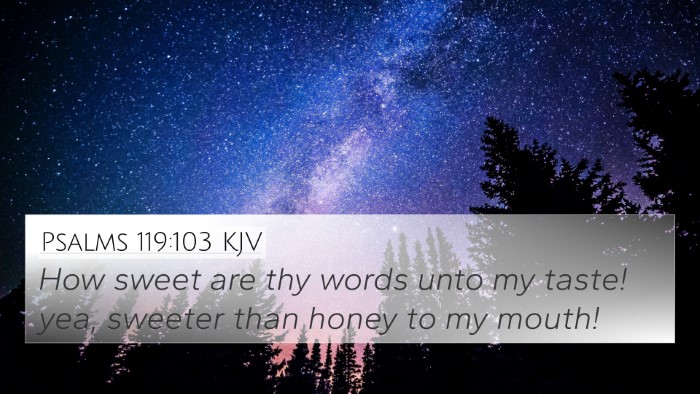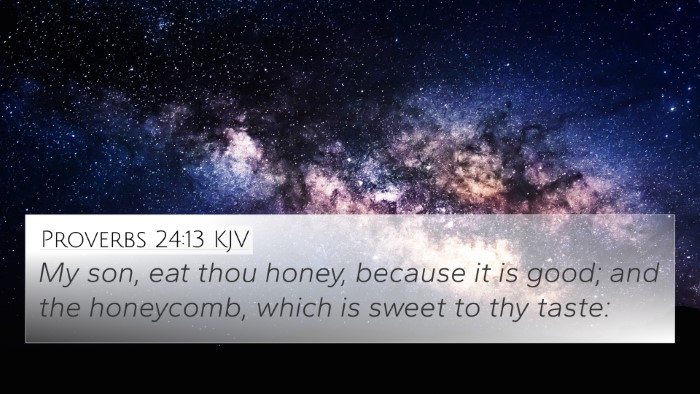Psalms 19:10 - Summary and Interpretations
Psalms 19:10 states:
"They are more to be desired than gold, yea, than much fine gold: sweeter also than honey and the honeycomb."
This verse highlights the immense value and desirability of God's laws, judgments, and statutes, likening them to precious commodities and delightful flavors. Below, we delve into various interpretations and understandings drawn from notable public domain commentaries.
Significance of God's Law
Matthew Henry emphasizes the surpassing worth of God's commandments.
- He compares the desire for divine laws to the pursuit of gold, illustrating their superior value compared to material wealth.
- The sweetness of honey represents the joy and satisfaction derived from adhering to God’s teachings, suggesting that they provide a profound spiritual nourishment.
- Henry points out that true happiness is found not in earthly riches but in a relationship with God through His word.
Comparative Value
Albert Barnes draws attention to the comparative analysis between God's statutes and earthly treasures.
- He asserts that while gold has material value, the wisdom and guidance found in scripture are of far greater significance and benefit.
- Barnes highlights that this verse is an invitation to meditate on the treasures of God’s word, encouraging believers to elevate their spiritual pursuits above temporal gains.
- His commentary suggests that understanding and embracing divine teachings leads to a more fulfilling existence.
Spiritual Delight
Adam Clarke explores the theme of joy associated with spiritual truths.
- He notes that just as honey is sweet and delightful, the insights from God's laws bring joy to the hearts of believers.
- Clarke presents the idea that genuine contentment springs from a life aligned with God’s precepts, as opposed to the fleeting pleasures of gold.
- He underscores the role of scripture in fostering a deeper understanding of God, which, in turn, enhances personal joy and fulfillment.
Bible Cross References
Several Bible verses echo the sentiments expressed in Psalms 19:10, reinforcing its message:
- Job 23:12 - "Neither have I gone back from the commandment of his lips; I have esteemed the words of his mouth more than my necessary food."
- Psalm 119:127 - "Therefore I love thy commandments above gold; yea, above fine gold."
- Proverbs 3:13-14 - "Happy is the man that findeth wisdom, and the man that getteth understanding. For the merchandise of it is better than the merchandise of silver, and the gain thereof than fine gold."
- Matthew 4:4 - "But he answered and said, It is written, Man shall not live by bread alone, but by every word that proceedeth out of the mouth of God."
- 1 Peter 2:2 - "As newborn babes, desire the sincere milk of the word, that ye may grow thereby."
- Psalm 119:103 - "How sweet are thy words unto my taste! yea, sweeter than honey to my mouth!"
- Proverbs 8:10-11 - "Receive my instruction, and not silver; and knowledge rather than choice gold. For wisdom is better than rubies; and all the things that may be desired are not to be compared to it."
Thematic Connections
This verse serves as a bridge to exploring the interconnected themes within the Bible:
- We can see a pattern of valuing divine wisdom over worldly possessions in both the Old Testament and New Testament.
- The consistent call to embrace God's word as the ultimate source of satisfaction fosters an inter-Biblical dialogue on spirituality.
- The encouragement in Psalms 19:10 can be linked to the teachings of Jesus, where He emphasizes the importance of the spiritual over the material.
Conclusion
Understanding Psalms 19:10 involves recognizing the invitation to cherish God's commandments as more precious than earthly treasures. This verse, coupled with the insights from Matthew Henry, Albert Barnes, and Adam Clarke, encourages believers to immerse themselves in the richness of scripture, ultimately leading to a life full of joy, wisdom, and fulfillment.
As we seek to deepen our understanding, we can utilize tools for Bible cross-referencing to explore further connections and enrich our study of scripture.














